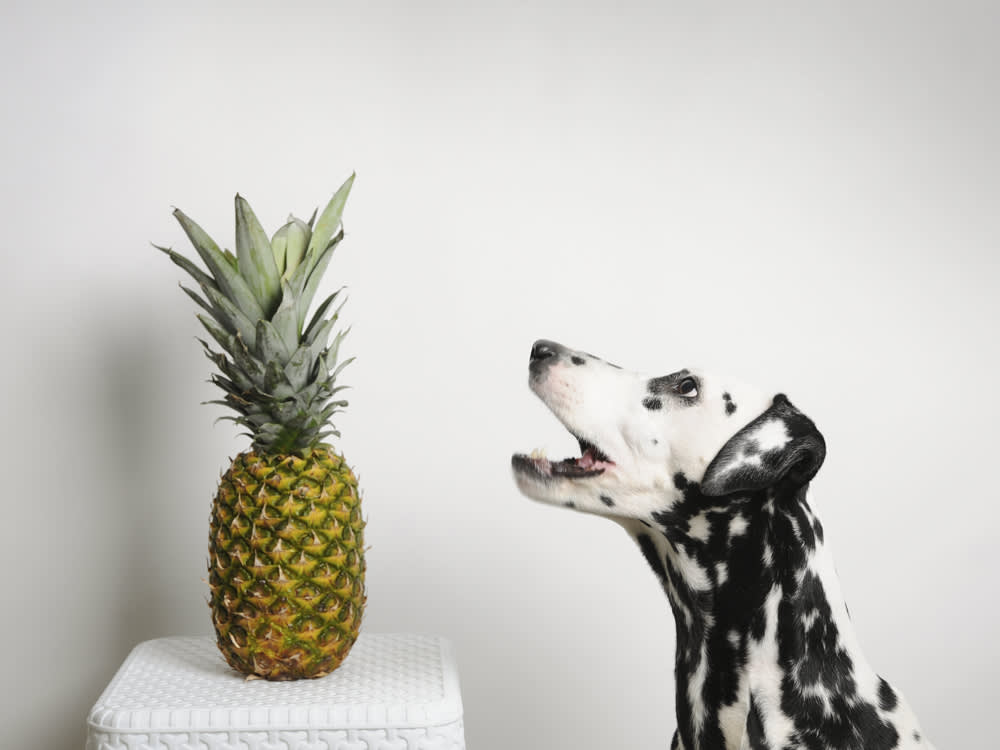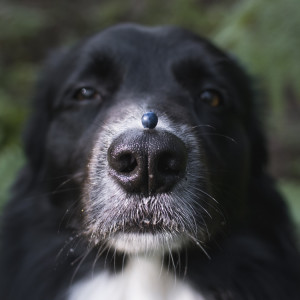Can Dogs Eat Pineapple?
Pineapple is a healthy, sweet treat for dogs—as long as you feed it to your pup in moderation.

Share Article
Pineapple is one of those fruits that can transport you to a tropical locale just by looking at it — and tasting it is even better. Can you share this sweet treat with your dog?
Nutrition facts about pineapple for dogs
Is pineapple good for dogs?
Pineapple is packed with vitamin B1 (thiamin) and vitamin B6, as well as minerals like iron, magnesium, and potassium. All of these nutrients help keep your dog’s digestive and immune systems healthy. In pineapple, you’ll also find bromelain, an enzyme that aids digestion, reduces inflammation, improves healing, and fights canceropens in new tab.
Pineapple is also an excellent source of vitamin C (also called ascorbic acid). For us humans who cannot produce vitamin C, pineapple is a great source of the vitamin. Dogs, on the other hand, do not require much vitamin C added to their diet because dogs (and cats) produce vitamin C naturally.
Can dogs eat pineapple?
Yes, dogs can eat pineapple. To serve pineapple to your dog, cut up raw, fresh pineapple into bite-sized chunks or sticks.

For a refreshing treat during the summer, freeze pineapple chunks before feeding them to your dog. Frozen pineapple contains just as many nutrients as fresh and will help keep your dog cool.
Is pineapple completely safe for dogs?
Pineapple is high in sugar and fiber, which means it can irritate your dog’s digestive system if you feed it to them in large amounts. Stick to small portions (a few chunks is enough), and keep an eye on your dog the first time you feed it to them. If it causes an upset stomach or diarrhea, switch to a fruit that's easier to digest like apples or bananas. You might find that your dog doesn’t like the smell or taste of pineapple — not all dogs do! If your dog isn’t a fan, there are many more dog-friendly superfoods to try.
Never feed your dog the core or spiky skin, which can cause an obstruction. Avoid canned pineapple, which is packed in sugary syrup that can irritate a dog’s digestive system and lead to diarrhea or vomiting.
Other fruits that are safe for dogs
Blackberries: Blackberries are chock full of antioxidantsopens in new tab and make a great treat for your dog.
Mango: Yes, dogs can safely eat this delicious fruitopens in new tab.
Apples: This fiber-filled fruit makes an excellent snackopens in new tab for your dog.
Other fruits that are dangerous for dogs
Grapes: Grapes contain tartaric acid, which is toxic for dogsopens in new tab and should be avoided at all costs.
Oranges: While the fruit is safe, orange peels, tree leaves, and tree branches contain an oil that is toxic to dogs and should be avoidedopens in new tab.
Watermelon: Watermelon seeds contain small amounts of cyanideopens in new tab, which can be fatal for dogs.
The bottom line: Can dogs eat human food?
Yes, dogs can eat certain human foods like pineapple, but always in moderation. Like all treats, pineapple should be supplementary to a complete and balanced dog food diet.
FAQs (People also ask):
How much pineapple can dogs eat?
Dogs can eat pineapple in moderation.
Is it OK to give dogs pineapple?
Yes! It’s OK to give your dog pineapple as an occasional treat.
Can dogs eat all parts of the pineapple?
No. Dogs should only eat fresh or frozen pineapple, with the spiky skin removed. Canned pineapple should be avoided due to its high sugar content.
Is pineapple healthy for dogs?
Pineapple is filled with vitamins B1, B6, and C, as well as iron, magnesium, and potassium, all of which are good for your dog’s digestive and immune systems.
References:

Daniela Lopez
Daniela Lopez is a digital media specialist and long-time contributor to The Bark.
Related articles
![Beagle eating food out of a dog bowl]()
Supplements Are Going to the Dogs
An integrative vet helps suss out what’s beneficial versus what’s bogus.
![Teenagers Feeding a Dog Watermelon While Sitting In Car On a Sunny Day]()
9 Healthy Summer Snacks to Share With Your Dog
Your pup wants in on your crudité platter.
Can Dogs Eat Papaya?
They’re a nutritious treat for dogs. Here’s why.
![A close up view of a dog with a blueberry resting on its nose]()
Can Dogs Eat Blueberries?
Yep—blueberries are a fiber and antioxidant-packed snack for your pup.
Can Dogs Eat Raspberries?
They sure would like some of your farmers’ market haul.
Can Dogs Eat Pears?
It can be a fruit with an acquired taste, but can your pup... acquire it?






